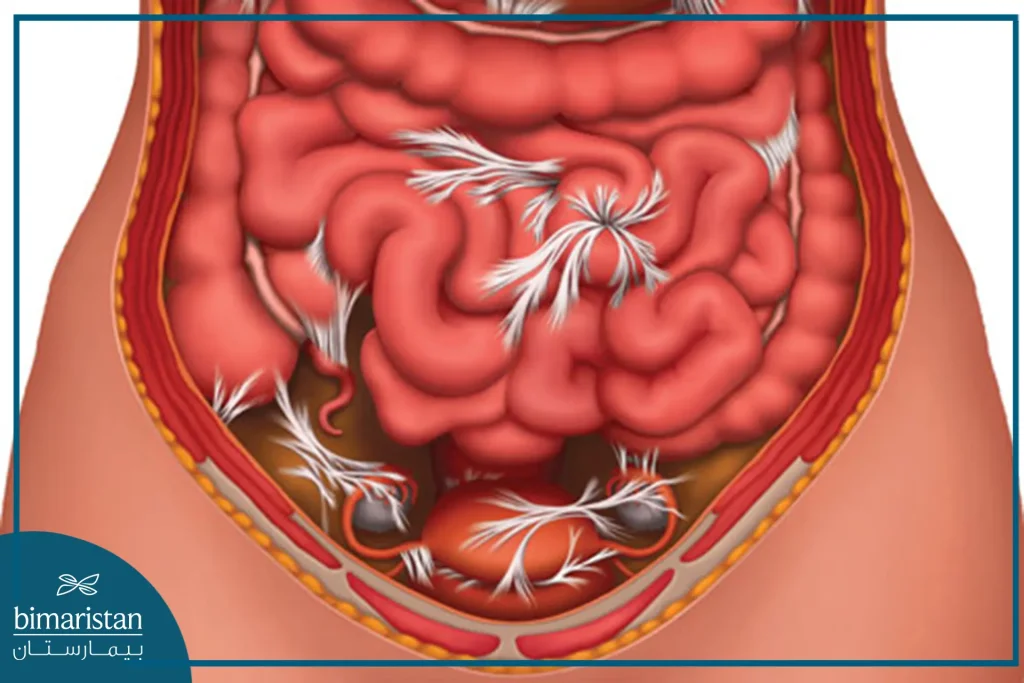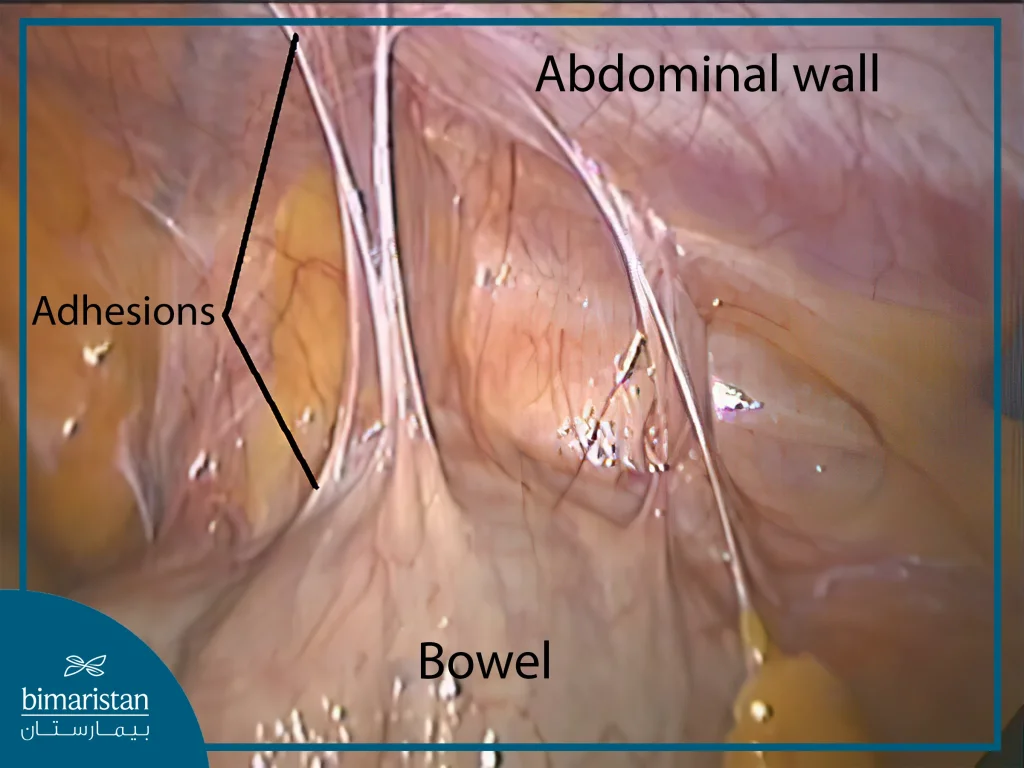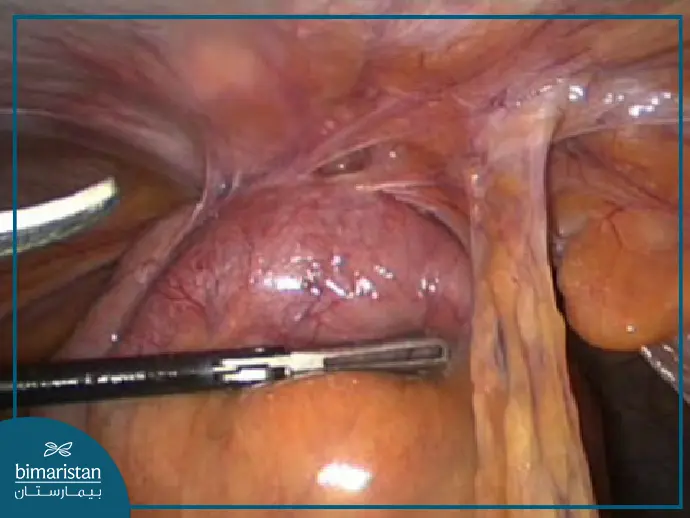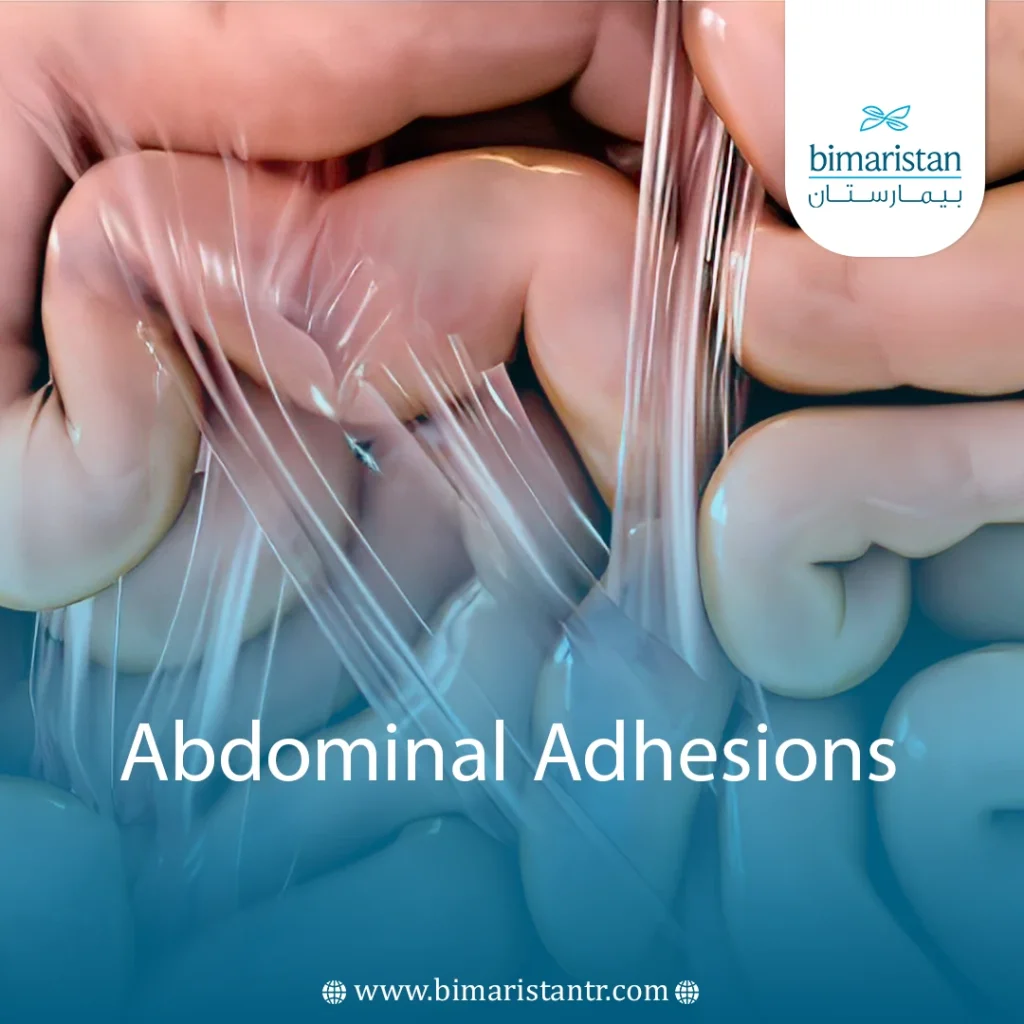Abdominal adhesion is a condition that occurs after surgery in 93% of people due to the formation of bands connecting the intestines and sometimes leads to intestinal obstruction, which requires emergency treatment.
Despite the large number of cases of abdominal adhesion, only 5-18% of them lead to intestinal obstruction due to the entrapment of an intestinal loop between the attached intestines and the obstruction of its course.
Abdominal adhesions lead to conditions other than obstruction and occur for reasons other than surgery. Follow us to learn more about intestinal adhesions.
Causes of abdominal adhesions
A previous surgical procedure is the most common cause of abdominal adhesions (intestinal adhesions after surgery). Because the closed abdominal cavity has its own environment when the abdomen is opened and exposed to the outside atmosphere, a substance called fibrin is formed that connects the intestinal loops and leads to their adhesion to each other (such as intestinal adhesions after a cesarean section).
Surgery is not the only cause of abdominal adhesions. Other important causes of adhesions include:
- Abdominal injuries: Because they can lead to the formation of scars, which may cause abdominal adhesions.
- Abdominal infections: Inflammation and infections of the intestines or adjacent organs can cause the formation of scar tissue and adhesions.
- Abdominal tumors: Some tumors can interfere with the structure of the intestine and lead to adhesions.
- Radiation therapy of the abdomen: Due to the presence of tumors
- Appendicitis: Inflammation of the appendix may lead to the formation of scar tissue that can cause adhesions. Intestinal adhesions may also occur after appendectomy.
- Crohn’s disease: Crohn’s disease and other inflammatory bowel diseases may increase the chances of adhesions.
- The presence of foreign bodies in the abdominal cavity: For example, forgetting bandages in the abdominal cavity after surgery.
- The presence of a genetic predisposition: Such as a relative having had intestinal adhesions in the past.
- Peritoneal dialysis in patients with kidney failure.
It is important to follow up on medical care and consult with doctors in case of any abnormal symptoms or changes in the digestive system.

What are the symptoms of abdominal adhesions?
Abdominal adhesions are usually asymptomatic, but they sometimes lead to health problems for the patient. The most important of these diseases and their symptoms that appear at that time are:
- Symptoms of intestinal obstruction
- Abdominal pain
- Nausea
- Vomiting
- Change in bowel habits (usually constipation and, in some cases, diarrhea)
- Intestinal gas retention
- Loss of appetite
- Enlarged abdomen (due to obstruction)
- Symptoms of interrupted intestinal perfusion (acute or chronic intestinal infarction)
- Abdominal pain while eating
- Severe pain requiring emergency care for the patient
- General fatigue
- Weight loss (due to malabsorption) in chronic cases
- Infertility in women
- Adhesions make it difficult for the egg to move to the fertilization site, and thus, pregnancy does not occur.
- Symptoms of abdominal infections
- Fever
- Tachycardia
- Severe pain
Diagnosis of abdominal adhesions
Diagnosis of intestinal adhesions usually includes a combination of medical history, medical examination, and radiological imaging studies. Here are some common methods used to diagnose intestinal adhesions:
- Medical history: The doctor asks about the patient’s symptoms, such as the nature and duration of abdominal pain, changes in bowel habits, and any history of abdominal surgery or injury.
- Physical examination: A thorough physical examination includes a pressure test on the abdomen, abdominal distention, or signs of bowel obstruction.
- Blood tests: These tests are done to check for signs of inflammation or infection, such as an increase in the number of white blood cells.
- Imaging studies: To image the abdominal organs and determine the presence of adhesions, these studies include:
- Computed tomography (CT) scan
- Magnetic resonance imaging (MRI)
- X-rays
- Laparoscopy: Laparoscopy is a surgical procedure that involves inserting a thin, flexible tube with a camera (laparoscope) through a small incision in the abdomen. This allows direct visualization of the abdominal organs, and if adhesions are found, they can be treated in the same procedure.

- Barium endoscopy: such as a barium swallow or barium enema study to highlight the intestine’s structure on X-rays. These studies help identify any abnormalities in the digestive system, including adhesions.
Individuals who experience symptoms that suggest intestinal adhesions should see a specialist doctor for a comprehensive evaluation and appropriate diagnostic tests to avoid serious complications of abdominal adhesions.
How are abdominal adhesions treated?
Asymptomatic adhesions usually do not require treatment unless symptoms and complications of intestinal adhesions occur, in which case intervention is done to dissolve abdominal adhesions. Surgery is most often the treatment, although it may sometimes not be needed.
Intestinal Adhesion Surgery
If abdominal adhesions cause symptoms or complications, doctors can dissolve the adhesions and treat them with laparoscopic surgery (laparoscopy) or open surgery. However, adhesion surgery may lead to the formation of new adhesions. If you suspect you have abdominal adhesions, contact us to learn about the benefits and risks of intestinal adhesion surgery.
If abdominal adhesions are causing a bowel obstruction, you must be treated in hospital immediately. Doctors will examine you and may order tests to see if you need emergency surgery to untie the adhesions, which relieves the bowel obstruction.

Treating Intestinal Adhesions Without Surgery
If you do not need emergency surgery, doctors may try to treat the obstruction without surgery. They will give you intravenous (IV) fluids and insert a tube through your nose into your stomach to remove the contents of your digestive tract above the obstruction. In some cases, the obstruction may resolve on its own. If it does not, surgeons will perform surgery to release the adhesions, relieving the intestinal obstruction.
Finally, abdominal adhesions are a condition that most people are unaware of. A person may have general symptoms (such as digestive symptoms) for a long time, and these symptoms are caused by intestinal adhesions. Urgent care should be received if a person develops severe abdominal symptoms to treat intestinal adhesions if they are the cause.
Sources:

